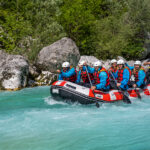Go circular to end supply chain chaos
If we don’t invest in the circular economy, we’ll soon be investing in more chaotic price rises and supply shortages. Do it now, and we can be world leaders in […]
If we don’t invest in the circular economy, we’ll soon be investing in more chaotic price rises and supply shortages. Do it now, and we can be world leaders in high value innovation, writes Andy Kenworthy.
Modern New Zealand is an outpost of the industrialised lifestyle developed in the great land masses of the world. That lifestyle is currently unsustainable. It’s even more unsustainable on some remote islands in the middle of the South Pacific.
A circular economy, where resources are never abandoned to become waste or pollution, is the only viable long-term option. The need for change is more acute in New Zealand than elsewhere. So we must take the lead.
Our wake-up call came in 2018. China stopped accepting all the rubbish our linear economy generates. New Zealand can’t generate the economies of scale for the kinds of massive waste facilities used in Europe, Asia and the United States. We don’t have easy access to viable markets for the resources these systems reclaim.
“Without a circular economy, we’re left with difficult options. They’re not ones we can be proud of.”
Without a circular economy, we’re left with difficult options. They’re not ones we can be proud of. We can bury what we don’t want to burn. Or we can try to keep piling our waste on other people when we can afford the shipping.
Other wake up calls are sounding too. You’ll no doubt have noticed how the pandemic has disrupted our extended supply lines. Shipping costs are sky rocketing. The invasion of Ukraine has hiked oil prices. These problems will not be short-lived, and there will be more.
Many of them will be driven by the worsening climate change situation and the resource scarcities our linear economy is creating.
So, we urgently need to shift our path onto a sustainable one.
Key principles of the circular economy
The circular economy is based on three key principles. They can be applied at every level, from the smallest business to entire economies. They also address the system’s current failures.
These three principles also create incredibly valuable efficiencies, innovation and business opportunities. These can themselves become scalable and saleable ideas for a world hungry for answers.
Firstly, we have to design out waste and pollution, and, crucially support others that do.
This means taking a close look at all our products and processes and seeing what is necessary, and what is not.
What is only there to create short term convenience at the expense of our future? This could mean phasing out single use plastic packaging. It could mean avoiding toxic materials and ingredients. Or it could mean shifting to less damaging forms of distribution and transport.
Following on from this, we have to keep products and materials in use. We need this to inform the selection of all the materials we use and how we use them. They need to be easily reclaimed by your company or a related one. They can’t just be left to enter the waste stream or the environment.
The final principle is what underpins the whole and is the reason for the whole effort. We must regenerate natural systems. It is these systems that everything else relies on. All businesses in Aotearoa New Zealand need to help rejuvenate our landscapes, waterways and seas. A quick search of the news is all it takes to know how much this is needed.
Less reliant, more independent
It is the application of, and investment in, these principles that will create the independence and resilience we need. It will make us less susceptible to disruptions from overseas, because we will be less reliant and more independent. What we learn in doing so may contribute, with great reward, to the reduction of those disruptions worldwide.
This is the best way to maintain the lifestyles we have become accustomed to, and for every Kiwi to enjoy them.
The Sustainable Business Network is among many groups across the country working to make the circular economy a reality. We’re facilitating cross sector workshops on packaging. We are developing best practice on sustainable procurement. We’re promoting product stewardship. We offer a host of ways to transform your businesses alongside others.
On 12th April, we’re launching the country’s first online Circular Economy Directory. This will connect businesses offering circular economy solutions with those looking for them. You can apply for a free listing, or find out more about all this work, at www.sustainable.org.nz.
Andy Kenworthy is the communications and campaigns manager for the Sustainable Business Network. Email [email protected]


